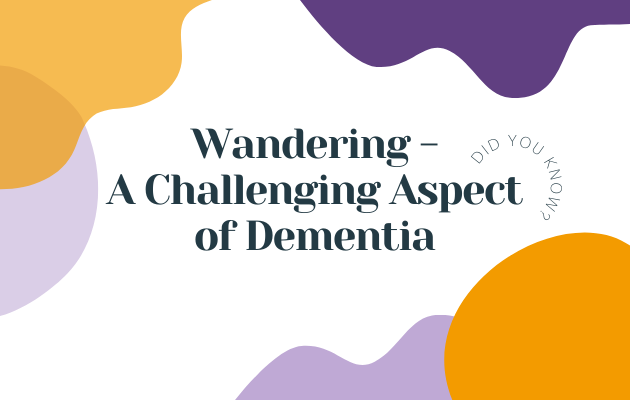Call us today at:
866-821-4333Call us today at:
866-821-4333Dec 14,2022

“Alzheimer’s disease causes people to lose their ability to recognize familiar places and faces. It’s common for a person living with dementia to wander or become lost or confused about their location, and it can happen at any stage of the disease. Six in 10 people living with dementia will wander at least once; many do so repeatedly. Although common, wandering can be dangerous — even life-threatening — and the stress of this risk weighs heavily on caregivers and family.” (via Wandering – Alzheimer’s Association)
Causes of wandering are not well understood. Some experts believe it is caused by disconnection among brain regions responsible for visual and special awareness, motor, and memory functions.
Scenarios that have been identified to trigger wandering episodes in an individual with dementia are:
The screening questions that are often used to determine an individual’s wandering risk levels.
(via Wandering & Sundowning in Dementia – Practical Neurology)
“If an individual is found to be at risk for wandering, they suggest that hiring a companion caregiver or attending an adult day care program for engagement in enjoyable, (stimulating) activities that incorporate supervised walks or exercise programs during the day, may minimize the wandering risk.
Recently, the explosion of discrete and affordable wearable devices that have global positioning system (GPS) tracking ability have significantly expanded the number of “high-tech” options available to address elopement. These include GPS tagging, bed and door alarms, and surveillance systems.” (via Wandering & Sundowning in Dementia – Practical Neurology)
Read both the Alzheimer’s Association and Practical Neurology articles through these links:
Elder-Well® Adult Day Program offers enriching and therapeutic cognitive, social and physical activities, providing a day of purpose, friendship and support. If you are interested in learning more about how you can open your own Elder-Well Center, contact us today! info@elderwelladultday.com
Disclaimer: Nothing on this website is intended, and shall not be deemed to constitute, an offer to sell a franchise. Franchise offerings are made only by a Franchise Disclosure Document and only in those states where permitted. The Elder-Well Franchise Disclosure Document has not been filed with any franchise registration state.